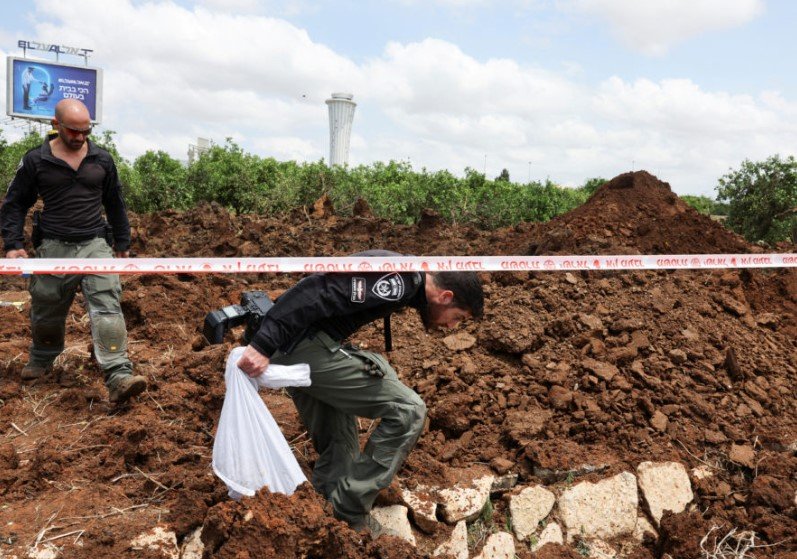Yemen’s rebels issue public warnings before launching missiles on Ben Gurion Airport, signaling a chilling new phase in their campaign
In a stunning turn that’s caught both analysts and civilians off guard, Yemen’s Houthi rebels are now warning Israeli civilians to evacuate before launching missile strikes. It’s a shift not just in tactics—but in messaging. And it’s eerily familiar. The group is now using evacuation-style alerts that closely resemble those historically issued by the Israeli military before bombings in Gaza and Yemen.
Multiple alerts were pushed publicly by the Houthis over the past 24 hours, explicitly telling people to flee areas around Tel Aviv’s Ben Gurion International Airport. Minutes later, the missiles followed.
The Warnings Are New—The Intent Is Not
For years, the Houthis have made clear their opposition to Israel’s actions in Gaza. What’s changed now is how they’re delivering that opposition.
Gone are the cryptic claims of responsibility or vague threats. Instead, the group has started releasing timed, public evacuation warnings, specifying areas of Tel Aviv that are about to be targeted. Their language echoes Israel’s own method of issuing “knock on the roof” alerts before major airstrikes.
One alert urged foreign nationals and airlines to “leave immediately” for their own safety.
That same day, missiles were launched toward Ben Gurion International Airport.

The May 14 Strike Changed the Tempo
On May 14, the Houthis said they launched a hypersonic ballistic missile that struck Ben Gurion Airport. Flights were halted. Chaos spread. Tel Aviv’s sky lit up as interception attempts failed to stop the incoming projectile.
It was the third strike on the airport in under 24 hours.
And with each strike, the language of their warnings grew bolder.
Just hours before that missile hit, the group had distributed a clear message:
-
Evacuate surrounding areas of the airport
-
Airlines should reroute or cancel flights
-
Foreign nationals should depart immediately
This type of language, almost bureaucratic in tone, sent chills down spines. Not because it came from a new source—but because it was so familiar.
Message Within the Method: It’s Political
The Houthis are trying to draw a mirror image: “If Israel can claim legitimacy through prior warnings, why can’t we?” one Middle East analyst wrote on social media. The tactic appears designed to challenge narratives of proportionality and self-defense, flipping the script Israel has used for years.
Moreover, the warnings allow the Houthis to:
-
Create a media moment
-
Exert psychological pressure on Israeli civilians
-
Undermine Israel’s perception of security
-
Signal operational confidence and missile accuracy
It’s propaganda and provocation rolled into one.
Airlines Are Feeling the Pressure
The ripple effect has been swift. Ryanair, one of Europe’s largest low-cost carriers, recently said it might reroute aircraft away from Tel Aviv altogether. CEO Michael O’Leary didn’t mince words.
“We’re running out of patience,” he said on a call with investors.
Ryanair had only resumed service to Israel in March, after suspending operations for months. But following the May 14 attack and the latest warnings, flights were grounded again.
A few other airlines resumed limited operations. But as of this week, many remain cautious.
Here’s how recent airline responses stack up:
| Airline | Status Post-May 14 Strike | Remarks |
|---|---|---|
| Ryanair | Suspended flights again | Might divert aircraft permanently |
| Lufthansa | Partial resumption | Limited routes only |
| El Al | Continuing operations | Increased security on flights |
| Emirates | Cautious, reduced frequency | Monitoring situation closely |
The Gaza Connection: Why the Houthis Say They’re Striking
The Houthis insist their attacks on Israel are acts of solidarity with Gaza. Since Israel launched its intense military campaign on the Strip, the rebels have vowed retaliation unless Israel lifts its siege.
They’re not alone in that sentiment. Iran, their primary backer, has long positioned itself as a defender of the Palestinian cause. But the Houthis are putting that into action—with long-range weapons and a new style of warning.
Their spokesman, Yahya Sare’e, said in a broadcast: “This is only the beginning unless the siege on Gaza ends.”
And he made no apologies for targeting a civilian airport.
This Isn’t Just Optics—It’s Escalation
What looks like a shift in messaging is, at its core, a move toward full-spectrum warfare. The Houthis have access to drones, ballistic missiles, and now—clearly—a working PR apparatus.
Israel, for its part, has responded by bombing the Sanaa airport, causing $500 million in damages according to regional reports. While some limited flights resumed, the broader impact is felt across the Red Sea.
Even seasoned defense analysts are uneasy. Because if the Houthis are mimicking Israeli military doctrine, they’re doing it to make a point—and possibly to push the conflict into new, uncharted territory.
Civilians Caught in the Middle, Again
No matter how you read this escalation, one fact remains: civilians are once again in the crosshairs.
Tel Aviv residents reported moments of terror as the alarms sounded. Many had just minutes—or less—to shelter. The idea that attackers are now giving “polite notice” before attempting to destroy key infrastructure is a cruel irony.
And in Gaza, the original flashpoint for all of this, the humanitarian situation continues to spiral.
You can draw your lines however you want—this side, that side, justified, retaliatory—but people are paying the price.
